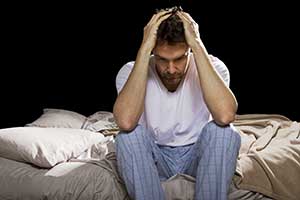-
Nighttime Urination and Vein Health
Posted on September 28, 2015 by Vein Admin in nighttime urination, varicose veins, vein health, vein screeningFrequent trips to the bathroom, especially at night, are often seen as a natural occurrence of either age or simply water consumption, and, because of this, are often ignored or seen as inconsequential. Nighttime urination, however, can be the sign of a serious problem, and, over time, can disrupt a person’s sleep patterns and result in poor attention span and cognitive performance the next day and in the long run.
Patients with venous insufficiency and high venous pressure will experience swelling in their legs due to water and protein (serum) leaking from their thin-walled veins into the surrounding tissue during periods of leg dependency such as sitting, standing, or walking. The serum that leaks out then returns to the venous circulation through the lymphatic system when the legs are even with or elevated above the level of the heart, typically when a person is lying down or sleeping. The hydrostatic pressure caused by a person’s height in a vertical position, the pressure that forces the fluid from the veins into the tissues in the first place, is not present when the body is in a horizontal position and tricks a person’s kidneys into thinking there is excess fluid in the arteries.
When serum mixes with the venous blood, a person’s kidneys then filter the excess water from the blood and store it in the bladder as urine. Once the bladder is full, sensory nerves alert the body to a need to urinate, and there is a heavy correlation between the amount of fluid accumulation in the legs and the number of times that a person has to urinate. While most people experience some form of edema in their legs or feet by the end of the day, having to urinate more than once during any given night could be the sign of a problem.
The onset of edema (swelling) in the legs due to venous insufficiency can be subtle and gradual, even taking years to develop noticeably, with frequent nighttime urination trips increasing over time. There are other behaviors that can cause excess fluids to be present in the veins and tissues, such as excessive salt intake and the use of certain types of stockings, but, if varicose veins are present, then it is probably safe to say that venous insufficiency is causing or at least contributing to a person’s nighttime urination trips.
If nighttime urination is disrupting your sleep and affecting your concentration throughout the day, then it may be time to seek treatment for your varicose veins or venous insufficiency. Dr. Magnant of Vein Specialists will be able to determine and diagnose the underlying cause of your nighttime urination, and through minimally invasive and relatively painless treatment procedures, help you to achieve increased comfort, peace of mind, and a better night’s sleep.






